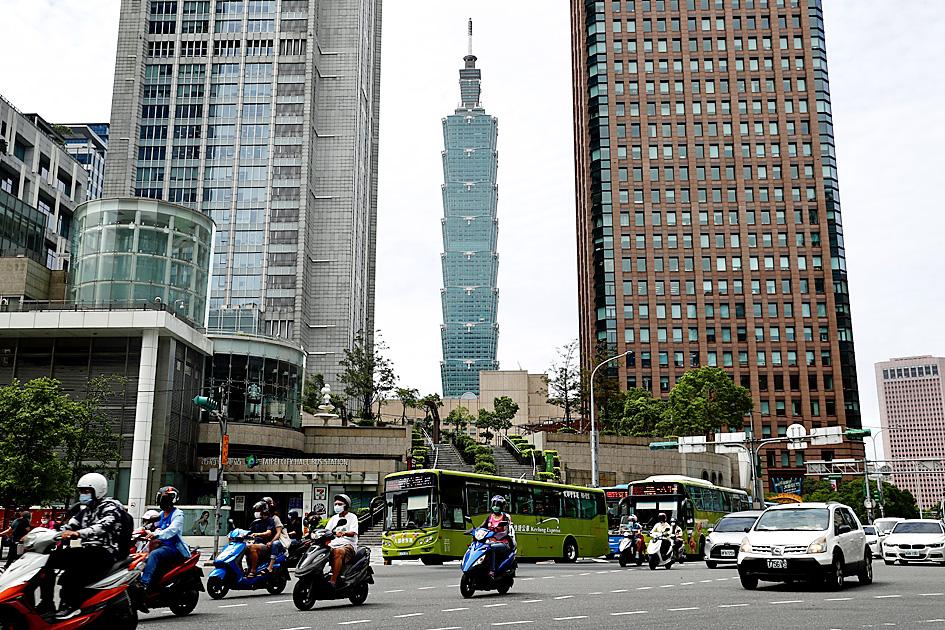Taiwan remained the fifth-largest net creditor in the world at the end of last year as the nation’s net international investment position (NIIP) reached a new high, the central bank said on Tuesday.
NIIP is the difference between a country’s external financial assets and its external financial liabilities.
At the end of last year, Taiwan’s external assets totaled US$2.492 trillion and its external liability was US$1.121 trillion.

Photo: Ritchie B. Tongo, EPA-EFE
These figures meant that Taiwan’s NIIP reached a record of US$1.371 trillion, up US$23.25 billion — or 1.7 percent — from a year earlier, the bank said.
External liability includes government and private debt, with external assets held by public entities and legal residents also taken into account for NIIP calculations.
The bank said that Taiwan’s NIIP trailed Japan’s US$3.7210 trillion, Germany’s US$3.1280 trillion, Hong Kong’s US$2.1528 trillion and China’s US$2.1503 trillion.
Hong Kong rose one notch in the rankings, replacing China as the third-largest net creditor worldwide as the territory’s assets rose and liability fell, the central bank said.
Taiwan’s net assets at the end of last year rose 10.5 percent from a year earlier, with life insurance companies holding more foreign securities, the bank said.
Taiwan’s net liability rose 23.5 percent, as the value of securities held by foreign investors expanded significantly, it said.
Last year, the TAIEX soared 22.8 percent from a year earlier, largely driven by ample liquidity, despite the COVID-19 pandemic, it said.
In addition to a high-flying equity market, the expanded external liability also resulted from an improved bond market, further pushing up the value of assets held by foreign investors, it said.
The US remained the largest net debtor in the world at the end of last year, with external liabilities hitting a new high of more than US$14 trillion, the central bank said.

TECH CLUSTER: The US company’s new office is in the Shalun Smart Green Energy Science City, a new AI industry base and cybersecurity hub in southern Taiwan US chip designer Advanced Micro Devices Inc (AMD) yesterday launched an office in Tainan’s Gueiren District (歸仁), marking a significant milestone in the development of southern Taiwan’s artificial intelligence (AI) industry, the Tainan City Government said in a statement. AMD Taiwan general manager Vincent Chern (陳民皓) presided over the opening ceremony for the company’s new office at the Shalun Smart Green Energy Science City (沙崙智慧綠能科學城), a new AI industry base and cybersecurity hub in southern Taiwan. Facilities in the new office include an information processing center, and a research and development (R&D) center, the Tainan Economic Development Bureau said. The Ministry

ADVERSARIES: The new list includes 11 entities in China and one in Taiwan, which is a local branch of Chinese cloud computing firm Inspur Group The US added dozens of entities to a trade blacklist on Tuesday, the US Department of Commerce said, in part to disrupt Beijing’s artificial intelligence (AI) and advanced computing capabilities. The action affects 80 entities from countries including China, the United Arab Emirates and Iran, with the commerce department citing their “activities contrary to US national security and foreign policy.” Those added to the “entity list” are restricted from obtaining US items and technologies without government authorization. “We will not allow adversaries to exploit American technology to bolster their own militaries and threaten American lives,” US Secretary of Commerce Howard Lutnick said. The entities

Minister of Finance Chuang Tsui-yun (莊翠雲) yesterday told lawmakers that she “would not speculate,” but a “response plan” has been prepared in case Taiwan is targeted by US President Donald Trump’s reciprocal tariffs, which are to be announced on Wednesday next week. The Trump administration, including US Secretary of the Treasury Scott Bessent, has said that much of the proposed reciprocal tariffs would focus on the 15 countries that have the highest trade surpluses with the US. Bessent has referred to those countries as the “dirty 15,” but has not named them. Last year, Taiwan’s US$73.9 billion trade surplus with the US

The Taipei International Cycle Show (Taipei Cycle) yesterday opened at the Taipei Nangang Exhibition Center, with the event’s organizer expecting a steady recovery in the industry this year following a tough last year. This year, 980 companies from 35 countries are participating in the annual bicycle trade show, showcasing technological breakthroughs and market development trends of the bicycle industry at 3,600 booths, the Taiwan External Trade Development Council (TAITRA, 外貿協會) said in a statement. Under the theme “Ride the Revolution,” the exhibition has attracted more than 3,500 international buyers from 80 countries to preregister for the four-day event, which is expected to